Meal planning and grocery shopping can feel overwhelming — even when we’re not in the middle of a pandemic. Now, with daily norms shifted as we follow stay-at-home and social distancing orders, we may be facing even greater challenges getting food home and onto our tables. Luckily, there are things you can do to shop smarter and eat healthier, despite the recent changes in our routines.
Whether you’re stocking up or refreshing your weekly menu, consider the following tips for shopping and meal planning. Every time you fill your cart (in person or online), consider shelf-stable versions of your favorite products. Incorporating these foods is not only a good idea for building a healthy pantry, but they also can help you manage blood pressure and cholesterol levels. You might experience improved weight and blood sugar management, too.
How to Grocery Shop Smart During the Pandemic
1. Free up the fridge
One easy change you can make is to choose shelf-stable milk. Powdered cow’s milk and plant-based milks are a great way to stock up on dairy and dairy alternatives without taking up valuable fridge space. Just add water to powdered cow’s milk and use it in baking, smoothies, or any other way you’d use regular milk.
One serving of plant-based milk replaces a serving of cow’s milk containing micronutrients such as calcium, vitamin E and vitamin D. Soy milk is the closest alternative to cow’s milk, providing 6 to 7 grams of protein per cup. (Note: Though shelf-stable, plant-based milks may have different storage instructions, so be sure to check labels.)
These nutritious space-savers are also compatible with most diets:
- Most are vegan and dairy free, and some are soy free (not soy milk, of course)
- Dairy alternatives provide heart-healthy omega fats and contain no saturated fats
- Choose ‘no added sugar’ or ‘unsweetened’ varieties for less carbohydrate intake
2. Pack in the protein
Protein can be found in each of the five food groups (however, it is nearly absent in fruit). Storing meat and seafood in the freezer is a good way to keep plenty of protein options on hand. Did you know that frozen seafood is flash-frozen at its peak of freshness? It makes for a delicious and quick-thawing lean protein that can be combined easily with other food groups.
When you need a quicker or more convenient option, consider plant-based grains and proteins. These foods can be enjoyed by themselves or combined with meats, seafoods or other plant-based proteins. You might be surprised by how nutritious they are! For example:
Wild rice: 7 grams of protein per 1 cup cooked
Beans (no-salt-added canned or dry): 15 grams of protein per 1 cup cooked
Lentils: 18 grams of protein per 1 cup cooked
Chickpeas: 15 grams of protein per 1 cup cooked
Nutritional yeast: 14 grams of protein per 1 ounce
Ancient grains (such as spelt and teff): 10 grams of protein per 1 cup cooked
Green peas: 9 grams of protein per 1 cup cooked
Quinoa: 9 grams of protein per 1 cup cooked
Oatmeal: 6 grams per half-cup serving
3. Think fruits and veggies, first
According to the Academy of Nutrition and Dietetics, a healthy and filling meal consists of at least three food groups. Look to canned, pre-packaged or dried forms of fruits and vegetables which have no added salt or sugar. Try combining your favorite fruits and vegetables with recipes that contain shelf-stable proteins. Need inspiration? Check out these yummy recipes. You could also try some tasty flavor boosters with what’s in your pantry right now.
4. Order everything online
Unable to go into the grocery store or don’t have a Kroger store nearby? Do you prefer items get shipped directly to your doorstep? Perfect! Utilize these resources for modifying the way you typically shop.
Kroger – Shop all departments online and submit a pickup or delivery order from your local store. Browse coupons and recipes that are personalized for you based on what you already purchase. You can even shop specialty diets such as vegetarian or ketogenic foods. All nutrition information is available on food items, so it’s just like checking them out in the aisles.
Kroger Ship – Shop all departments for shelf-stable items. Since items are shipped, refrigerated products are not available. Home and baby items, food, supplements, and health and wellness products can all be delivered right to your home.
Vitacost – Looking for specialty diet foods (gluten-free, vegan, paleo, etc.)? Vitacost has a great selection of natural and organic foods, along with health and wellness products for pets and kids, your home, your beauty routine and much more.
After you become comfortable with preparing a variety of shelf-stable food items, you can easily adopt them into your regular routine for variety and health benefits. However you enjoy them, take comfort in knowing that enjoyable and healthy meals don’t always have to come from the fresh section – they can come from your pantry and freezer, too!

